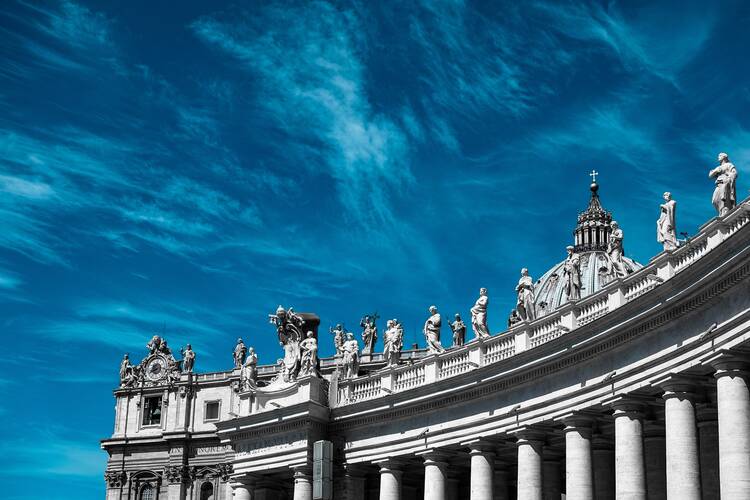A Reflection for the Memorial of St. Augustine, Bishop and Doctor of the Church
Find today’s readings here.
Try something for me. Look around and find an electronic gadget. Wait, there’s one in front of you, right? Imagine turning it off and handing it to someone who was a contemporary of St. Augustine. This person takes the device, looking confused. After all, they live in Hippo and it’s the year 400! What would they make of this thing? Is it a brick? A platter? It sure doesn’t look useful.
Our ancestors couldn’t possibly make sense of something like a smartphone, and you and I get that. But what we often don’t get is that this difficulty runs in two directions; it is challenging for us to understand their world as well. We modern humans are notoriously arrogant. But what if we encounter the past with respect and a healthy dose of confusion?
Today’s readings take us from Thessalonica (Greece) and back to Judea (Israel) during the first century, all while as a global community we mark the passing of Augustine (North Africa) three centuries later.
Paul and his friends send a letter. (1 Thes 1:1-5, 8-10)
This text reminds us of how difficult it was to reach people. Letters were the only way to stay in touch, and having them delivered could take months. It was important to write with care because you couldn’t hit delete or unsend, and there must have been a built-in hyper-awareness that what was communicated should still matter many months later. No urgent news in these letters. Instead they were meant to encourage, teach and inspire for a long time. If we’re honest, from our vantage point, it’s hard to make out what Paul and his friends are talking about; they are referring to events and people we don’t know. It all feels very cryptic unless we have the whole letter, maps and a couple of history books about the ancient world. We also need to keep in mind that the letter was copied over and over (and over). Clearly our ancestors in faith thought these thoughts essential and wanted to pass them along. The oldest copy we have comes from 150 years after the original letter was written (that’s a lot of copying without a copy machine), likely transcribed by someone in Egypt.
Our ancestors couldn’t possibly make sense of something like a smartphone, and you and I get that. But this difficulty runs in two directions; it is challenging for us to understand their world as well.
Jesus gets very upset. (Mt 23:13-22)
This text gives us a front seat to a heated debate. Something is happening that has everyone on edge, and in this account, Jesus will have none of it. We can tell this disagreement is not about concepts but about a concrete situation being faced by an insider group in which all know what it means. We know this because what appear to be familiar customs and groups are brought up. Although the voice in the text is assigned to Jesus, the Gospel of Matthew was composed after the year 70 AD. This means it gets written down probably at least 20 years after Paul’s letter, which itself was written a couple of decades after Jesus’s death. The community group we call Matthean is writing about their internal difficulties, and their memories of Jesus help them make their way through them.
Augustine, Bishop of Hippo, dies, and we remember.
That today the church remembers the passing of a bishop and theologian who died almost 1,600 years ago is astounding. Martin Luther King died 55 years ago, and Abraham Lincoln 158 years ago. Can we imagine their holidays in the 35th century?! How did the church manage to keep alive the memory of our ancestors? We’re doing it still.
I like to say that the job of theologians is to discover insights, and I would love to hear what you may discover today. One thing I notice right away is the care with which our community has preserved things that could help us. St. Paul’s encouragement in the face of difficulties; Jesus’ voice clamoring that the reign of God is for all and no one has a right to set barriers to it; and Augustine, a flawed human in a world in turmoil, whose faith called him to ponder, to see “the world itself as God’s greatest miracle” and to invite us to do the same. We remember.








